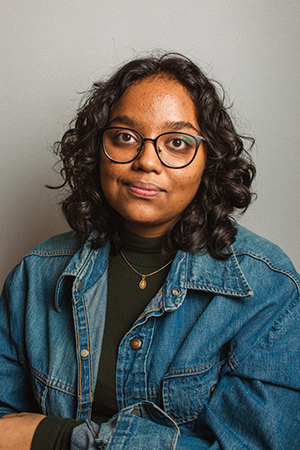Unearthing, Becoming: Paul Monfette in Conversation with Rachel Lachmansingh

Rachel Lachmansingh, whose story "Primary Organs" appears in The Malahat Review's winter issue #213, discusses writing as an unearthing, working on novels vs. short stories, and delving into the perspective of a young child in her Q&A with Malahat Review volunteer Paul Monfette. Read an excerpt of "Primary Organs" here.
Rachel Lachmansingh is a Guyanese-Canadian fiction writer and poet from Toronto. She is currently pursuing her degree in creative writing. Her work has appeared in Minola Review, Grain Magazine, Augur Magazine, carte blanche (forthcoming) and elsewhere. She is currently working on a novel and a collection of short stories.
What did you draw on within yourself to inhabit the body/mind of six-year-old protagonist/narrator Eileen in "Primary Organs”?
Empathy is integral to my writing process, so when writing Eileen, I didn’t just want to write her—I wanted to understand her worldview by stepping into her mind. Recalling memories from when I was Eileen’s age was helpful for this, and one of the story’s details is actually a true story! I remembered being in my grade one gym class, and my teacher talking about shoe soles. For a moment, I wondered if he was referring to souls, since I’d never heard the word before. This was a fleeting thought, but I somehow remembered it during drafting. It was a great reminder of the specific brand of curiosity young children possess and I tried to integrate that into the narrative.
It is such a cool and original title and subject matter in the story. Where did the impetus come from for the story?
This story began as a lot of my short fiction does—in a strange, immersive daze. I view writing as an unearthing, or a becoming, of having a particular block of “soapstone” and whittling that, line by line, into what the story becomes. Trusting my gut is critical in my drafting process. Sometimes I have to let myself take a backseat and really allow the story to drive itself. This is how “Primary Organs” came to be! I didn’t consciously construct the idea, instead, it slowly revealed itself. I feel really grateful to my writing in that way—it lets me glimpse into these moments I would not otherwise see.
How did you want the reader to view the mother?
This character was interesting to write because she is constructed through observation. Because the narrator is so young, this observation is filtered through an innocent lens that sometimes falters and makes visible the tragedy of Eileen’s situation. I hope in that small pocket, where Eileen’s innocence dissolves, a reader can conclude what they will about her mother, since I think there is certainly more than one interpretation!
I read that you have a novel you are working on, how is that going and are you finding the process very different from writing short stories?
What’s interesting about my writing history is that I first started out as a novelist! I’ve been writing novels since I was twelve and only branched out into short fiction in recent years. Of course, the novel is a much bigger space to uncover, and can also be a longer time commitment. I’ve found the more I write brief pieces, the longer I need with a novel. Before I ventured into short fiction, I wrote novels a lot quicker, almost snapping through them without noticing. Short fiction, though it often takes less time, has taught me the importance of “grazing” through a novel. Where I may understand a short story’s core in just a few minutes or a few weeks due to its brevity, that same core may not be revealed to me for months or years when working on a novel. It takes me longer to really understand my novels now, which I actually appreciate! It’s a gift to discover a story for the first time.
What themes do you like exploring in your writing and why?
Lately, I’ve found myself gravitating toward explorations of self-identity, whether that’s a lack of identity, a character’s insecurities, or desire for a different identity. I’m certainly interested in uncovering the “uglier” sides of characters—the faces they hide from everyone, even me as the writer! I also love writing about women and girlhood and finding one’s footing in a society that projects certain expectations on certain bodies. The collection of short stories I’m working on really centres this—the relationships people have with themselves, both mentally and physically, and how that may manifest in relationships or interactions with others.

Paul Monfette
* * * * * * * *









